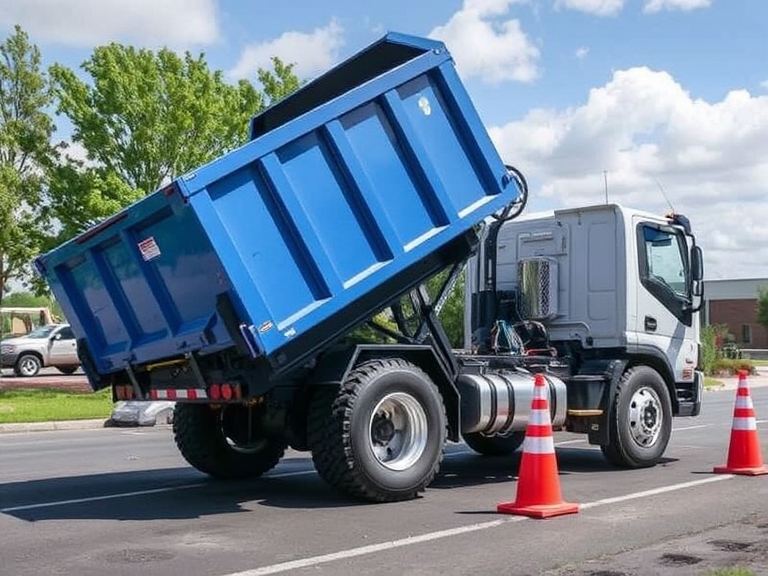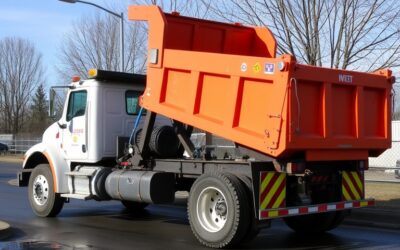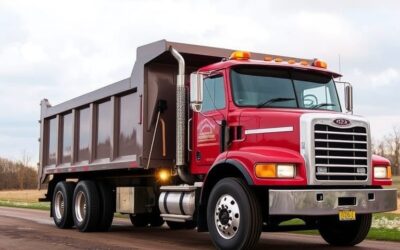Dump trucks are powerhouses on job sites, but with that power comes the risk of tipping over, leading to accidents, damage, and injuries. A tipping dump truck can cause accidents, damage, and even injuries. That’s why it’s important to know how to keep your truck balanced and safe.
Understanding what causes dump trucks to tip over is the first step in preventing it. Things like uneven loads, sharp turns, and soft ground can make a dump truck unstable. By knowing these risks, you can take steps to avoid them and keep your truck upright.
There are many tips and tools to help you keep your dump truck from tipping. From managing your load better to using advanced technology, each method plays a big role in truck safety. Following simple practices can make a huge difference. Whether you’re a new driver or have lots of experience, these easy tips will help you keep your truck stable and safe.
In this article, we’ll look at the common causes of tipping, offer tips for load management, explore tech solutions, and share best practices for safe operations. Let’s make sure your dump truck stays on all its wheels and you stay safe.
Understanding Common Causes of Dump Truck Tipping
Dump trucks can tip over for several reasons, but understanding the most common causes helps you prevent them:
- Uneven Loads: When the load in the dump truck isn’t evenly spread, the truck can become unbalanced. This imbalance makes it easier for the truck to tip over, especially when making turns or driving on slopes.
- Sharp Turns: Taking sharp turns at high speeds can cause a dump truck to tip. Trucks have a high center of gravity, which means they are more likely to tip if they’re not driven carefully.
- Soft or Uneven Ground: Driving on soft or uneven ground can lead to tipping. If one side of the truck sinks or tilts, it can make the whole truck unstable.
- Sudden Stops or Starts: Making sudden stops or quick starts can cause the load to shift. This sudden movement can make the truck tip, especially if the load is heavy.
- Overloading: Carrying more than the truck’s capacity also leads to tipping. Extra weight makes the truck harder to control and increases the chances of tipping.
Understanding these causes allows you to take better precautions. By being aware of these risks, you can take steps to avoid them and keep your truck stable.
Easy Tips for Load Management and Balance
Proper load management is one of the easiest ways to prevent your dump truck from tipping. Here’s how:
- Even Load Distribution: Always spread the load evenly across the bed of the truck. This helps keep the truck balanced and reduces the risk of tipping.
- Secure the Load: Use tarps, ropes, or straps to secure the load. This stops the load from moving around during the drive, which helps keep the truck steady.
- Load in Layers: When possible, load the truck in layers. Put the heaviest items on the bottom and lighter items on top. This lowers the center of gravity and helps keep the truck balanced.
- Avoid Overloading: Stick to the truck’s weight limit. Overloading makes the truck less stable and harder to control.
- Check Before Driving: Before you start driving, always check that the load is evenly distributed and secure. Make adjustments if necessary.
- Unload on Level Ground: Always try to unload on flat, stable ground. This minimizes the risk of tipping when raising the bed to dump the load.
By following these tips, you can effectively manage your load and keep your dump truck stable. Proper load management is a simple yet powerful tool to prevent tipping and ensure safe operations.
Technology Solutions to Enhance Stability
Technology can make a big difference in keeping dump trucks stable. Here are some solutions to help prevent tipping:
- Anti-Tip Devices: Anti-tip devices like the Wink Anti-Tip help keep the truck balanced. This device monitors the truck’s tilt and makes adjustments to keep it stable. It can automatically lower the bed if it senses the truck is about to tip.
- Stability Control Systems: Stability control systems used in large trucks can also help with dump trucks. These systems help manage speed and braking to keep the truck balanced, especially during turns.
- Load Monitoring Systems: Load monitoring systems provide real-time data on load weight and distribution. These systems help make sure the truck is not overloaded and that the load is evenly spread.
- GPS and Telematics: GPS and telematics systems offer real-time tracking and monitoring of the truck’s performance. These systems can alert drivers and managers to potential issues, such as driving on uneven ground or making sharp turns.
- Cameras and Sensors: Cameras and sensors can improve visibility and help drivers see blind spots and obstacles. This extra visibility can help drivers make better decisions and avoid tipping risks.
Using these technologies helps increase the overall safety and stability of dump trucks. They provide real-time solutions and constant monitoring, making it easier to prevent tipping incidents.
Best Practices for Safe Dump Truck Operations
Following safe practices is essential to preventing dump truck tip-overs. Here’s what you need to know:
- Proper Training: Make sure all drivers are well-trained in operating dump trucks. Regular training sessions keep drivers updated on safe practices and how to use new technologies.
- Pre-Trip Inspections: Always conduct a thorough inspection before starting a trip. Check the tires, brakes, hydraulic systems, and load security. Fix any issues before hitting the road.
- Drive Carefully: Maintain safe speeds, especially when carrying heavy loads or driving on uneven surfaces. Avoid sudden stops, starts, or sharp turns that can throw off the truck’s balance.
- Communicate: Use communication tools to stay in touch with other drivers and dispatch teams. Clear communication can help navigate tricky situations and avoid hazards.
- Follow Weight Limits: Never exceed the truck’s weight limits. Overloading makes the truck harder to control and increases the risk of tipping.
- Know Your Route: Plan and know your route before you start driving. Avoid roads with steep inclines, sharp turns, or soft ground whenever possible.
- Safe Unloading: When it’s time to unload, do it on level, stable ground. Raise the bed slowly and ensure no one is nearby. Quick movements or uneven ground can cause tipping.
By following these best practices, drivers can maintain control of their dump trucks and prevent tipping incidents. Safe operation is critical for both the driver and everyone on the road.
Conclusion
Preventing dump truck tip-overs means knowing the risks, managing your load, using the right technology, and following safe practices. With the right knowledge and tools, you can keep your dump truck stable and your operations safe. Each part of this process is crucial to maintaining stability and safety on the job. Load management helps distribute weight evenly, reducing the chances of tipping. Advanced technologies like anti-tip devices and load monitoring systems provide invaluable real-time feedback and corrections. Following best practices ensures that both new and seasoned drivers operate the trucks safely.
Keeping your dump truck stable is not just about preventing accidents; it’s about ensuring the safety and efficiency of your operations. With the right knowledge, tools, and habits, you can significantly reduce the risks associated with dump truck tipping. This approach protects valuable equipment, and more importantly, it keeps drivers and others safe.
For more details on how to equip your dump trucks with top-of-the-line anti-tip over devices, check out Wink Anti-Tip. Let us help you keep your trucks stable and your operations safe.





